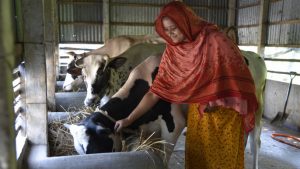Building on the ASEAN-Australia-New Zealand Free Trade Agreement (AANZFTA), IA-CEPA highlights the importance of trade liberalisation for Australian dairy.
IA-CEPA and AANZFTA, in combination, will provide an estimated saving of over A$10.5 million in tariffs that would otherwise be levied on Australian dairy exports to Indonesia if neither agreement was in force (estimate based on the average value of Australian dairy exports to Indonesia over recent years).
Key facts and figures on Australia’s dairy trade with Indonesia:
Indonesia is Australia’s third largest dairy export market, ranking behind only China and Japan in value terms.
Australia exported 37,600 tonnes of dairy products to Indonesia, worth US $101.9 million (March 2019 to February 2020).
The biggest volume growth for Australian dairy exports to Indonesia (product categories exceeding US$1 million) has been in Condensed Milk (173%), Cheese (70%), Whey Powder (52%) and Butter (20%).
Australian dairy processors have an established track record of partnering with ingredient blenders and food manufacturers in Indonesia to supply high quality, innovative dairy products. Food manufacturers in turn add value; creating jobs and wealth in respective supply chains. IA-CEPA will add to the already strong relationship between Australian dairy and importers of Australian dairy in Indonesia.
The benefits of IA-CEPA:
Under IA-CEPA, Indonesia will eliminate tariffs on dairy products not already eliminated under the AANZFTA. Existing import tariffs will be removed on entry into force for skim and whole milk powders and grated and powdered cheese. Remaining tariffs on liquid milk will be eliminated by 2033. IA-CEPA will provide Australian dairy with tariff advantages over key competitors.
Another important feature of IA-CEPA is the inclusion on a cooperative mechanism to address non-tariff measures (NTMs). This is the first time such a mechanism has been written into a free trade agreement to which Australia is a party. NTMs such as licencing arrangements and product testing can present significant hurdles for Australian dairy exporters and add to the cost of doing business. Regular and ongoing dialogue on NTMs will allow for the identification, communication and potential resolution of the issues.
Dairy Australia’s key international marketing programs and activities
Dairy Australia runs programs to strengthen relationships with key trading economies including Indonesia. These programs are designed to foster relationships, providing invaluable links within the Indonesian market. Participants in these programs are shown the best of Australian dairy and provided with insight into our quality assurance and regulatory standards, demonstrating Australia’s incredible value proposition.
The implementation of IA-CEPA will assist to strengthen and support existing and new relationships and networks between the Australian dairy industry and customers in the market.













